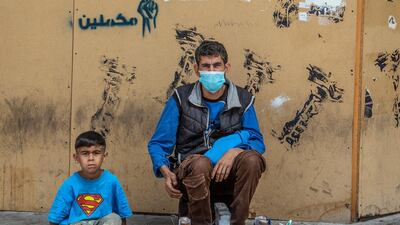Lebanon's Economy Minister, Raoul Nehme, this week told The National that the government is powerless in the face of "catastrophic" poverty to come. The use of this term is not necessarily an exaggeration. According to the World Bank, 60 per cent of Lebanese will be classed as poor by 2021, with ongoing banking and financial crises compounded by the economic downturn caused by the coronavirus pandemic.
According to Lebanese research firm Infopro, nearly 220,000 jobs were lost between October 2019 and January 2020 in the six million-strong nation. The Lebanese pound, meanwhile, had been devalued on the black market, leading to price hikes of as much as 70 per cent, according to Mr Nehme.
In times of hardships, people turn to their leaders for solutions and protection. Yet the Lebanese government seems to have already admitted defeat, its long-time leaders once more evading responsibility for the impending “catastrophe.” In early March, after nearly five months of anti-government protests, Beirut defaulted on its foreign debt for the first time in history, an all-time low that even 15 years of civil war had failed to produce.
Instead of taking stock of its failures, the post-war ruling elite has continued to deny its responsibility and deflect attention. Hezbollah and its friends have attacked the governor of the Central Bank, Riad Salameh – who had been reappointed by their ally President Michel Aoun in 2017 – and accused previous governments of being the problem.
The political class that has headed the country since the end of the civil war cannot escape responsibility for the consequences of three decades of mismanagement and corruption. There is no reason why the fortunes of 60 per cent of all Lebanese must be sacrificed to keep inept leaders in power. Yet this seems to be the strategy of the country’s politicians. Speaking at the Beirut Institute Summit two weeks ago, Druze leader Walid Joumblatt predicted that sectarian leaders will each go their own way, undermining efforts to reach a good deal with the International Monetary Fund.
Many have held out the hope that discussions between the Lebanese government and the IMF for a potential bailout may resolve the nation's problems. But there is no reason to believe that those same people who have wrought despair upon their nation will be the ones to save it.
An IMF deal is no miracle cure to Lebanon’s long-standing woes, and will probably come with austerity measures that the current system cannot uphold.
The negotiations must not be used as a distraction by Hezbollah and its allies. Since the onset of the protests in October, politicians have waved magic solutions to deal with the country’s problems without compromising their rule, including the hope that Lebanon may become a wealthy oil exporter, an overblown claim that has already been deflated.
Six months of a Hezbollah-leaning government of so-called experts has failed to bring about real change. The IMF route could be the best solution for the country to stand back on its feet again, but if it is managed by the same elite, it may only add to the woes of a nation inching towards disaster.


